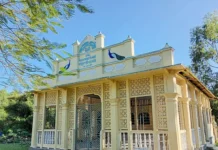Bangabandhu Sheikh Mujibur Rahman was not only a unique political leader with extraordinary charisma. He was the creator of history. He Was a major artisan and architect of history writing. Bangabandhu was the hero of history. History has made him the founder of history’s history. It is true that in the final judgment, the creator of history is the people But the person’s role is not denied by history. According to the needs of history, the person can wake the people and reflect the public speech of the awakened people – he becomes the ‘hero of history’.
Through a gradual evolution and evolutionary trend in the political-social sphere, Bangabandhu was able to grow in this position as the ‘great ruler of history’. The basic elements of various self-identities were developed gradually, such as his thoughts and ideals-life philosophy.
He had to walk on many trappings of politics. In the face of adversity of reality, he had to temporarily compromise. He went wrong in the way. But the overall dynamism of its overall evolution was in front, toward progress. In his case it could have happened naturally. Because he was a common man, he was the leader of the people, the leader of the public. He never had the theoretical scholar of politics. He was not a well-known scholar or an expert on one or more of the subjects. But he was a ‘super-wise’ leader, a leader. He was man’s man. He could accept from people, save the judicial resources. Dependence on humans. On human beings, such love and proximity to his people made him progressive and inevitably in the progress of his evolution.
Initially, he was a very dying teenager – ‘Mujibur’. To many, ‘Mujib Bhai’ Then ‘Mujibur Rahman’ or ‘Sheikh Mujibur Rahman’. After a long time, his name was ‘Sheikh Sahib’ in the face of people. After the mass upsurge of nine years, new identity ‘Bangabandhu’ After the war, he became the architect of the independent country and the father of the nation. This happened in the three decades of its time, the rise of his position.
His thoughts in three decades of political life-his life-philosophy had also taken off. The beginning was as a student activist of the Pakistan movement. But at that time there was a trend that was liberal and partly progressive in the Muslim League; Bangabandhu was Abul Hashem – Suhrawardy’s follower. He was also a fan of Netaji Subhash Bose. He was an enthusiastic youth participant, along with his partner-companion in various programs including ‘Rashid Ali Din’ in Calcutta with the Jhanda of Congress, Muslim League and Communist-
The history that created the ‘hero of history’ is his and the immortal creation of the people. The original essence of this creation is an independent state with new characteristics and character. The need to create a ‘history’ of a country is called ‘historical elements’. Nationalism, socialism, democracy, secularism – based on these four principles, being the chief architect of the birth of a new state, Parati was the historical factor which led to Bangabandhu becoming the ‘hero of history’. It is to be said that the historic legacy of Bangabandhu as the ‘hero of history’ is the fundamental ideological foundation of the great war of liberation.
The enemies of history have killed Bangabandhu, to reverse their history of ‘history’. He led the creation of ‘history’ – for this ‘crime’, the villain of the seventy-five murders of history killed him and took revenge. The country has taken the country back to the opposite direction of Pakistan. But blacks can not be run on the wrong side forever. In history, ‘history’ will be revived once again in new energy or one day. So with the force, I will say, ‘the realization of the precious history of’ history ‘and the revival of’ four state principles’ of the war of liberation is the biggest responsibility and duty of the nation today to ‘hero of history’.
Writer: Mujahidul Islam Selim
President, Bangladesh Communist Party.
E-mail: [email protected]





Comments are closed.